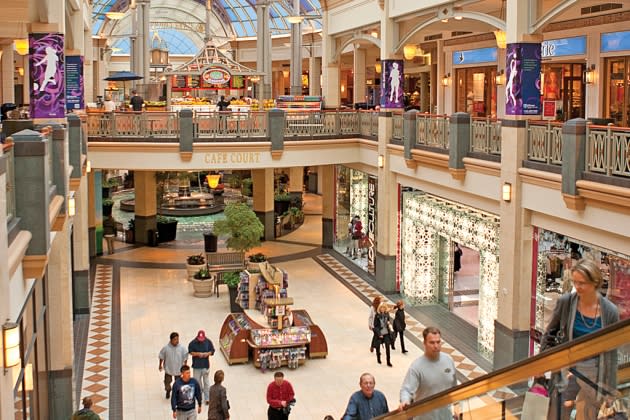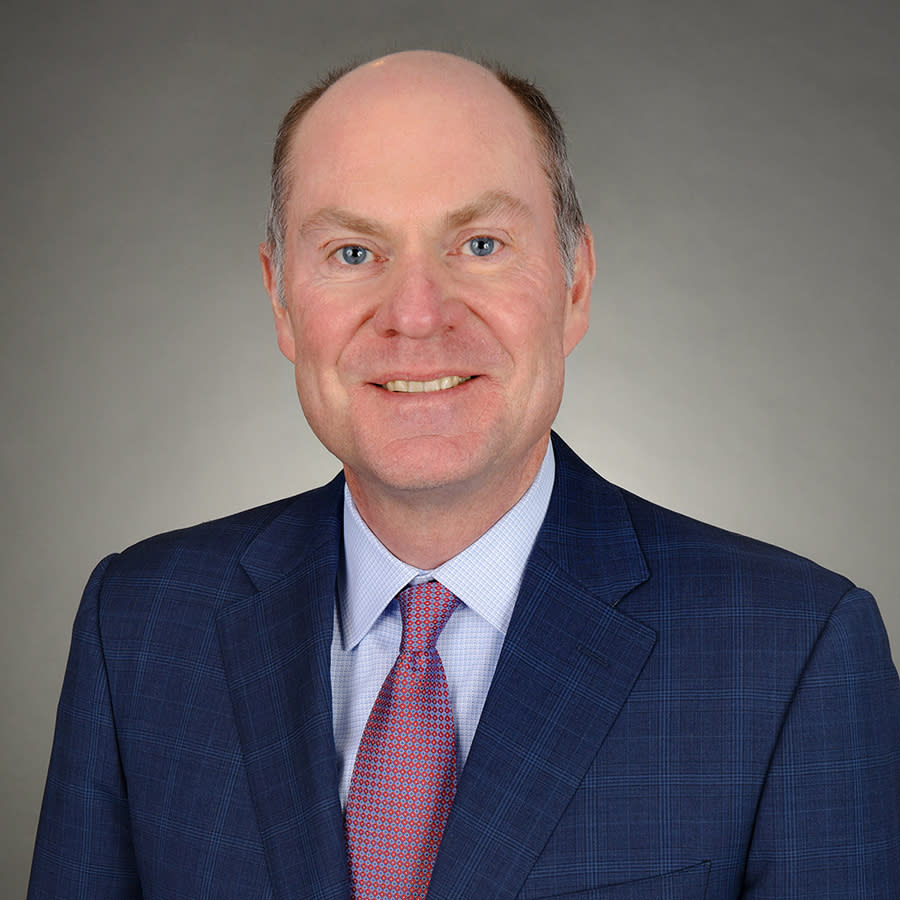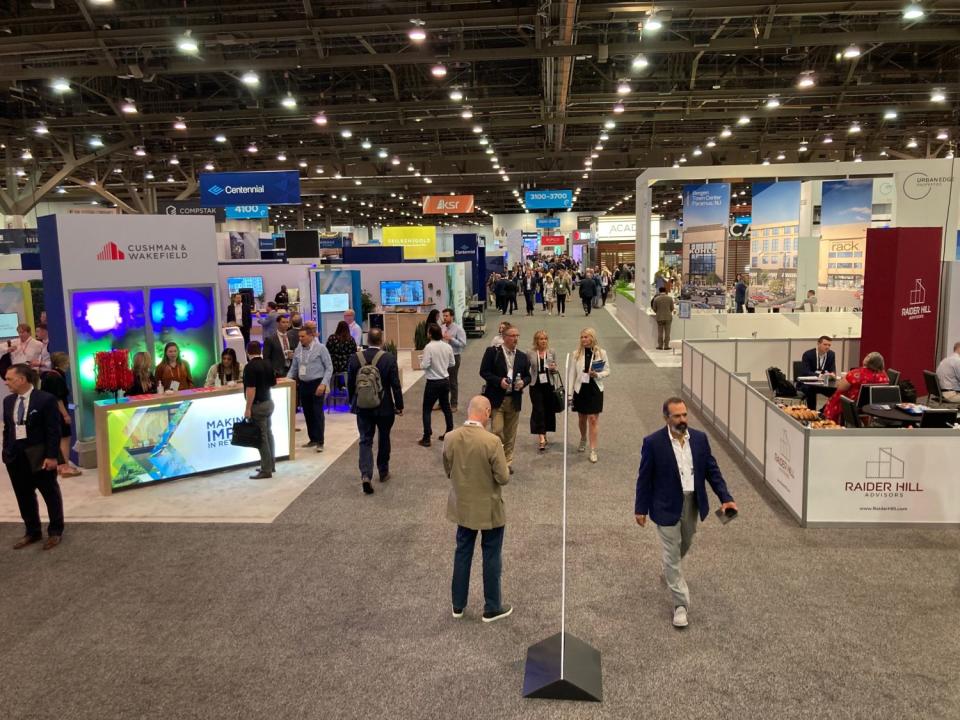ICSC Convention Spotlights a Changing Industry Rife With Challenges

Thousands of shopping center developers, property managers, dealmakers, retailers, architects and real estate brokers descended on Las Vegas this weekend for the ICSC convention, seeking ideas and answers on how to elevate productivity, differentiate their properties with new kinds of tenants and uses, and how to keep them as safe and secure as possible.
Still, amid the challenges posed by the volatile economy, inflation, shrinkage, consumer confidence recently slipping, rising incidents of crime and the internet, in a post-COVID-19 world shopper traffic has generally been recovering at most malls, lifestyle centers, outlet centers and power centers, at least so far.
More from WWD
Charlize Theron Africa Outreach Project 2023 Charity Event Red Carpet Arrivals
Inside the Vanity Fair x Prada Party at the 2023 Cannes Film Festival
“The industry’s mood is positive despite economic uncertainty,” Tom McGee, the president and chief executive officer of the ICSC, told WWD. “As our industry continues to evolve at a rapid pace, our members and industry decision-makers are excited to get together to share best practices and insights, connect with each other, and discuss the innovations driving the marketplaces industry and forward.”
He said the ICSC expected about 25,000 attendees at ICSC Las Vegas this year, representing a 10 percent increase in the number of attendees over 2022. There are 820 exhibitors showcasing their organizations’ projects and offerings across the convention floor at the Las Vegas Convention Center. The convention began Sunday and runs through Tuesday.
In the following email exchange, McGee discusses how the industry is adapting to the economy and quick-changing consumer trends and what the major concerns are.

WWD: What changes/innovations have been made to the convention this year?
Tom McGee: This year, we’re proud to showcase our latest innovation, ICSC Marketplaces IQ, a brand-new centralized platform that aggregates information and data to help our members find properties, perform market research, and analyze trends — all in the same place. We’re also pleased to emphasize efforts to enhance diversity and encourage talent development in the industry through moments like the ICSC Foundation Scholars Breakfast, our Diversity Reception and a Women’s Forum & Breakfast in partnership with the Crew Network.
WWD: What are the top three or four issues confronting developers and property owners/managers?
T.M.: The marketplaces industry continues to evolve as consumer habits and economic conditions change. Right now, property owners and developers, as well as retailers, are contending with higher interest rates, economic uncertainty and price-sensitive consumers. However, the industry is fundamentally quite sound: Leasing remains strong, occupancy rates are high, and announced store openings significantly outpaced closings last year, a trend that has carried into 2023.
Industry leaders are also adapting to shifting work and living patterns. Suburban retailers and property owners have benefited as many office workers embrace hybrid work and shop closer to home; conversely, many urban retailers in downtown areas are having to rethink their strategies. Retailers and property owners will remain focused on adapting to shifting consumer needs as the industry and the economy continue to evolve.
WWD: Do you see much consolidation happening in the near future, or is it more about selling off individual properties? Simon tried to buy Macerich a while ago.
T.M.: ICSC does not comment on individual member businesses or strategies.
WWD: What are retailers/brands/formats that are noticeably rolling out?
T.M.: We’ve seen particular interest in discount retail, dining out and experiences this year. That’s reflected in many of our exhibitors at ICSC Las Vegas, as companies such as Dollar General, The TJX Cos. Inc., Chick Salad Chick and Flite Golf & Entertainment are all taking space and showcasing their latest products, services and innovations on the show floor.
In general, we’re continuing to see brands express interest in opening stores, particularly in suburban areas. For example, Warby Parker is opening hundreds of stores across the country to expand their physical footprint, and Bloomingdale’s is opening new, smaller-format stores in an effort to experiment with creative formats. We also continue to see the “store within a store” format gain traction, allowing digitally native or smaller brands to make the most of the advantages of physical retail space. Regardless, retailers are always looking for innovative ways to meet consumer needs, and the creative use of space is a trend we expect will be on full display at ICSC Las Vegas.
WWD: What are the major ways developers are re-tenanting/transforming square footage for greater productivity and to fill vacant space?
T.M.: The industry is really embracing the idea of mixed-use retail to meet the growing — and changing — needs of consumers. In addition to developers putting an emphasis on housing to fill vacant spaces and exist in close proximity to retail properties, landlords are also embracing a more experiential approach to the retail landscape that increasingly includes theaters, restaurants, spas, fitness centers and other lifestyle attractions.
WWD: How is traffic holding up at shopping centers this year? Meeting expectations?
T.M.: Traffic is strong at shopping centers and has successfully rebounded from the pandemic. We’re seeing significant interest in open-air centers, suburban retail and mixed-use developments, and we expect those trends to continue. While foot traffic data can be noisy, month-over-month trends from Placer.ai show that traffic to open-air centers and outlet malls increased in April relative to March, and visits to indoor malls were right in line with March numbers despite one fewer calendar day in April. Overall, traffic is meeting expectations and we’re encouraged as we head into the busy summer season.
WWD: Comment on the impact of higher interest rates on developments and renovations.
T.M.: ICSC believes that the Federal Reserve’s efforts to combat inflation by raising interest rates are important for ensuring the stability and long-term health of the economy. That said, while higher rates may be necessary to stabilize the economy, they could slow development as borrowing becomes more expensive. Still, the industry is facing this challenge from a position of strength: America’s marketplaces are fundamentally healthy, and many indicators are at their strongest since the pandemic began. Overall occupancy is high at 91.8 percent, and rent collections were at 92 percent in March 2023. We are confident the industry will weather economic uncertainty and expect investment to continue in the long run.
WWD: Is the labor situation worsening or improving, and what types of jobs are the toughest to fill?
T.M.: In general, retailers are finding it easier to hire the staff they need than in the immediate aftermath of the pandemic. The strength in the labor market has been a positive for the industry overall, and we expect that to continue throughout 2023. In April, retail hiring increased 1.93 percent year-over-year, continuing four straight months of gains relative to the same months in 2022. Overall, the retail workforce is close to its highest-ever levels, with more than 12.4 million retail trade jobs that help form the backbone of our economy.
We are also continuing to see strong interest in our own career development offerings at ICSC, and we believe investing in the talent of the future is of paramount importance to the industry.
WWD: Are shopping centers increasing security measures, and if that’s the case, how so?
T.M.: While we do not advise property owners on security, each property is unique and must determine their own needs. We do work with several programs focused on mitigating crimes at shopping centers, including Louisiana State University’s Security Programs Institute to educate and train law enforcement and security personnel in a variety of different areas to include active shooter and terrorist situations. We are also a member of the Loss Prevention Research Council based at the University of Florida, which tests safety equipment and offers resources that aim to create safer environments at shopping centers.
WWD: Please cite a few exciting developments in the works in the U.S.
T.M.: The Uncommons in Vegas is a great example of what we are seeing in a number of markets with the increase in demand for work, play and gather communities. The development features office space, living space and an open space of dining options, all of which offer a diverse range of services and experiences.

Best of WWD

